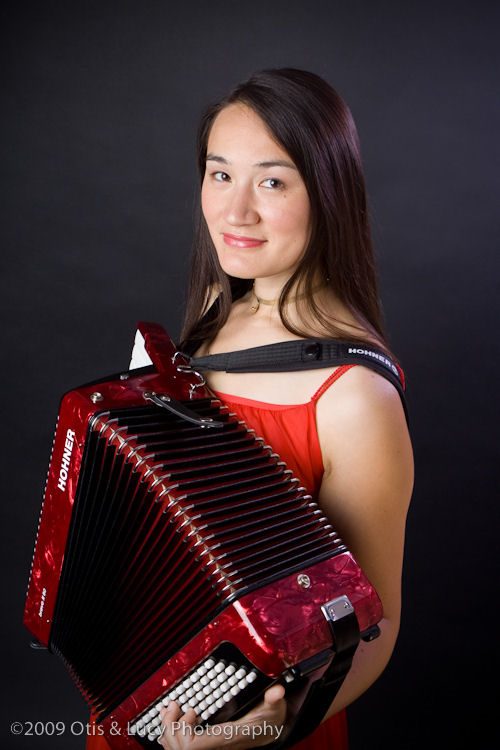JESSICA FICHOT AND THE PATH SHE FOLLOWS
A CHANTEUSE ON THE LOOSE
 Los Angeles-based singer and songwriter, Jessica Fichot sings passionately about passion. Love in bloom, love in all its achingly twisted turns, love in dreams, love devoted and love plain and simple. If one understands French, one would nod and sway knowingly to the songs: a musette here, a waltz there, and in the cabaret-like atmosphere that her recording, Le Chemin (The Path), creates, you would close your eyes and be there, be in love, and not want to leave. Then again, even without being bilingual, the songs breathe a plea, a promise, a passion, that transcends the lyrics, and the intoxication is a result of the music and the musicians bonding to forge an unmistakable effect. There is no possibility that she’s singing about a dropped croissant or missing a taxi along the Champs-Élysées. One non-original song choice is from The Umbrellas of Cherbourg, the Michel Legrand/Norman Gimbel classic song of undying devotion, I Will Wait for You, which is sung with convincing clarity, not unlike the bright colors that framed the film, but also with a warmer timbre and without the tearful pathos of the film version.
Los Angeles-based singer and songwriter, Jessica Fichot sings passionately about passion. Love in bloom, love in all its achingly twisted turns, love in dreams, love devoted and love plain and simple. If one understands French, one would nod and sway knowingly to the songs: a musette here, a waltz there, and in the cabaret-like atmosphere that her recording, Le Chemin (The Path), creates, you would close your eyes and be there, be in love, and not want to leave. Then again, even without being bilingual, the songs breathe a plea, a promise, a passion, that transcends the lyrics, and the intoxication is a result of the music and the musicians bonding to forge an unmistakable effect. There is no possibility that she’s singing about a dropped croissant or missing a taxi along the Champs-Élysées. One non-original song choice is from The Umbrellas of Cherbourg, the Michel Legrand/Norman Gimbel classic song of undying devotion, I Will Wait for You, which is sung with convincing clarity, not unlike the bright colors that framed the film, but also with a warmer timbre and without the tearful pathos of the film version.
Vocally caressing, with sharp and elegant accompaniment from a band well-versed in the finer points of gypsy jazz as well as on ballads and the folk/pop selections, Fichot also makes all the right choices in instrumentation. Her own accordion melodies fit the chanson arrangements and the “plinky” tones of a toy piano playfully accentuate a number of her original songs.
In between her hometown performances this month and next, Fichot, answered a few questions about her music and a new recording due in the fall of this year.
“It’s been 3 years since your last album. Has the scope or concept behind your music changed in any way or are there different directions that you have taken or will take before the next release?” I asked.
Jennifer responded, “While my songwriting style is pretty similar to that of my debut album (although I’d like to think it’s a little bit more sophisticated), I am definitely aiming to be more experimental with the recording and production of my second record. While there is nothing that can replace the sound of acoustic instruments such as accordion, clarinet, guitar, bass and strings – all of which I am using extensively in my new songs – I don’t want my recordings to sound exactly like my live performances, nor do I want my album to sound like it could have been recorded 10, 20 years ago or more.” She adds, “My goal in the album which I am currently working on is to incorporate some modern elements to my sound, which was pretty traditional in my debut album. For example, I have done a few tracks in which I took everyday objects (such as lighters, water splashing, silverware, paper ripping etc…) and used them as percussion, sometimes adding effects or transforming the sound in the mix. In addition to writing good songs and continuing to work with amazing musicians, and recording acoustic instruments, I am really interested in making the album interesting and experimental sound-wise.”
Attempting to twist a usually generic question to be more penetrating, she, thankfully, saved the day with an answer far more interesting than my inquiry. “What influences do you have from the past and who do you listen to for inspiration, now? And whom do you listen to just for the sheer joy?
“I continue to listen to classic French performers/songwriters such as Brassens, Gainsbourg and Piaf. But since I am also looking for inspiration and ideas on the production/sound side of things, I’ve recently been listening to Emilie Simon (who mixes French chanson with electronic music), Bjork, Spanish composer Mastretta (a multi-instrumentalist who mixes acoustic instruments like the bass clarinet with electronic ones, such as the theremin) and Patrick Watson (a Canadian singer/songwriter with a Radiohead vibe). My favorite artist is still Lhasa de Sela – partly because she is an amazingly soulful vocalist/songwriter, and partly because her musicians and producers are amazing, and gave her music the right mix of old and new. For sheer joy, right now, I am really enjoying the songs of Flight of the Conchords.
“Since Paris informs your music, do you feel that your music will always have that element in some shape or form whether it be language or the musical genre(s) you have drawn from?”, I asked. (Fichot was born in the U.S., but was raised in France and played the coffeehouses and other venues of Paris in her youth.)
“I don’t think I could get Paris out of me even if I tried – it’s the city I grew up in and it will always feel like my home. And, although I do enjoy singing in many different languages during my live performances, I definitely want to continue using French as my main songwriting and singing language for awhile. The funny thing is: I never wanted to write in French when I lived in France: I only performed in English. There is something liberating about performing in a language that is not the audience’s main language. Perhaps I will start writing in English again if I ever move back to Paris.”
Thinking of this country as being united in some areas, and extremely different in others, I wondered about the universal acceptance of a multi-ethnic performer singing songs in several languages (Fichot also sings in Spanish and Chinese as well as French and English). “Are you and your music treated differently in different parts of this country? Is the reaction any different in France or any other foreign countries?”
“I don’t think my music is treated differently in different parts of the country – however, I do notice a difference between performing in big cities and performing in small towns. In small towns, before the band even starts playing, it often feels like our performance is very special, because the people in the audience don’t usually have access to this type of music.” She added, “In the U.S. more than other countries, I feel like the audiences, in addition to reacting to the music itself, also react to the fact most of the songs are in French. There is a particular admiration that Americans have for French culture that I don’t see in every other country.”
“Are you finding that your particular sound, which builds on some things from the past and then adds other personal elements, is helping define a brand new category in popular music? It’s not just folk, or gypsy, or pop, or cabaret although it takes some from each. Are you finding a lot of other musicians out there doing work in a similar vein as opposed to when you first started out?”
“Yes, I definitely feel like there is a “return to folk/roots” movement. The most obvious proof of that (for me at least) is how popular the accordion is getting. When I started this project a little over 3 years ago, I taught myself accordion because I couldn’t find anyone who played it. Now, it seems like I am meeting more and more people who either play it, or are interested in playing it. I am also meeting more and more musicians who are interested in going back to their roots, culturally, and performing in their native language.”
The songs of Jennifer Fichot can be heard at several venues across the southland. Find her at: www.jessicasongs.com or www.myspace.com/jessicafichot
Saturday June 19th 2010 – 7:00pm
Make Music Pasadena Alliance Francaise Stage
34 East Union St., Pasadena CA 91103
Saturday July 17th 2010 – time TBA
Santa Barbara French Festival
Oak Park (W. Alamar Ave & W. Junipero St), Santa Barbara CA 93105
Saturday July 24th 2010 – noon
Skirball Center 2701 Sepulveda Blvd, Los Angeles, CA 90049
Jessica also appears in a trio format at:
Sunday June 27th 2010 – 7:00pm
Pop Champagne 33 E. Union St., Pasadena, CA 91103
Sunday July 11th 2010 – 7:00p,
Pop Champagne 33 E. Union St., Pasadena, CA 91103
Joel Okida is a struggling artist, struggling writer, and struggling musician. It occurs to him that life is all about the struggle. Fortunately, he did not take up acting. However, he’s not half-bad as a zydeco dancer and the ability to make a mean gumbo and lovely walnut tortes has gotten him by.
JESSICA FICHOT AND THE PATH SHE FOLLOWS
A CHANTEUSE ON THE LOOSE













